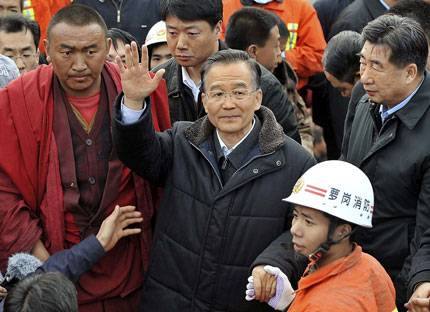Special Report:7.1-magnitude quake hits Qinghai>>

Thousands of rescuers fought altitude sickness, chilly weather, strong winds and frequent aftershocks yesterday to dig through rubble and reach survivors of a strong earthquake that has left at least 760 dead, 11,477 injured and 243 missing in northwest China.
The magnitude-7.1 quake, which struck the Tibetan Autonomous Prefecture of Yushu in southern Qinghai Province early on Wednesday, also toppled 15,000 residential buildings and forced 100,000 residents to be relocated, according to rescue headquarters.
Many people are still buried under the debris of collapsed houses in the hardest-hit Gyegu Town near the epicenter, the seat of the Yushu prefecture government and home to 100,000 people. It sits about 4,000 meters above sea level.
More than 85 percent of houses in Gyegu, mostly mud-brick and wood, collapsed.
In addition to professional search-and-rescue teams, almost 2,000 soldiers, police officers and fire fighters are using excavators, shovels or even bare hands to comb through the debris to find survivors.
More rescuers from across the country are en route to Yushu.
"Freezing weather, high altitude and thin air have all made rescue efforts difficult," said Hou Shike, deputy head of the China Inter-national Search and Rescue Team.
Some rescuers were feeling dizzy due to low oxygen levels soon after arriving at Yushu Airport on Wednesday night, Hou said.
Roads linking the airport and Gyegu were blocked by landslides triggered by the quake, which hampered rescue missions, he said.
At the Yushu Vocational School, more than 20 bodies have been recovered, but at least 20 others are still buried in the debris.
Chang Zhiqiang, a school official who has joined rescuers, said even sniffer dogs appeared to be affected by altitude sickness.
At least 774 aftershocks have been recorded in the quake zone so far, with the biggest at magnitude 6.3.
"We pulled four men alive from the debris of the collapsed Xibeiniu Hotel within five minutes today," Liu Xiangyang, of the China National Earthquake Disaster Relief Team, said yesterday. "But frequent aftershocks caused difficulties for rescuers."
Ren Tiesheng, deputy director of the Qinghai Provincial Seismological Bureau, warned yesterday that more aftershocks would hit the quake zone.
Rescuers have set up dozens of tents for survivors in Gyegu, but many more temporary dwellings are needed.
Many injured people were taken yesterday to hospitals in Xining, the provincial capital 800 kilometers away, by buses, privately owned cars and planes.
On the highway linking Yushu and Xining, sandstorms reduced visibility to only about 100 meters in some sections.
Professional rescuers, soldiers, police officers and medical workers have been sent to Yushu from across the country, along with tents, cotton-padded clothes, quilts, food, water, medicine, bulldozers, excavators, cranes, generators and other relief supplies.
Donations from governmental agencies, non-governmental organizations, privately run companies and individuals are also being rushed to the quake-hit region.
The United States yesterday donated US$100,000 to help with relief operations.
"We pulled out seven pupils alive from the debris of the Khampa Central Primary School today," Chen Guangbiao, a company board chairman-turned rescuer from eastern Jiangsu Province, said yesterday. "They were all of the Tibetan ethnic group. They were in good physical condition and have been sent to hospital."
President Hu Jintao and Premier Wen Jiabao have ordered local authorities to go all out to save the earthquake victims .
Wen arrived in Yushu yesterday afternoon after a three-hour flight. He inspected disaster relief work and visited those affected.
The State Council, or Cabinet, has set up a quake-relief headquarters, with Vice Premier Hui Liangyu as the head, to take care of disaster relief, epidemic prevention, seismic monitoring and public security.

Premier Wen Jiabao waves as he visits quake-affected people in Gyegu Town in the Yushu Tibetan Autonomous Prefecture in northwest China's Qinghai Province. Wen arrived in Yushu yesterday to check on rescue work and meet survivors. He clambered up a pile of rubble from a crushed building and addressed a large group of residents. "As long as there is the slightest hope, we will make a 100-percent effort," he told the crowd, speaking through a bullhorn in comments also translated into Tibetan.
Transport and communication facilities were restored within 24 hours after the quake hit, Hui said at a meeting held by the quake relief headquarters in Gyegu. Electricity and petrol supplies should be back within 48 hours.
The Qinghai government is using funds allocated from the central government and donations coming from within China to purchase more than 250 million yuan (US$36.62 million) worth of food, water, tents, machinery and other rescue resources.